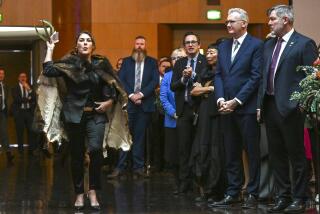Tourists Confused : English Upside Down in Land Down Under
SYDNEY, Australia — At the height of Australia’s recent bicentennial party, a confused American dining with Australian friends appealed for a crash course in the strange tongue the Australians call English.
“No worries, mate,” one of the Australians said. “Just toss the rule book on the rubbish heap. Ya gotta learn it word by word. For example, we call the postman a ‘postie,’ the milkman a ‘milkie’ and the truck driver a ‘truckie.’ But the garbage man, mind you, is a ‘garbo.’ ”
The next day, the American asked a government official if there indeed were no rules.
Rule Spelled Out
“Of course not,” he snickered. “There are rules. A garbage man is a garbo because, after all, he is actually a garbologist.”
The joke was on the American, who learned only days later that refugees are called “reffos” for no known reason at all.
Introduced to many Americans recently by Paul Hogan, star of the movie “Crocodile Dundee” and of television commercials promoting Australia, the dialect that one linguist has dubbed Aussietalk is in many ways a language that defies explanation. But that is somehow appropriate in a country that may be the world’s freest and zaniest democracy.
The nation’s foremost contemporary linguist, Alan Peterson, said in his book, “Words, Words, Words--The Use and Misuse of English in Australia Today,” that “our language is the most democratic thing that we have.”
In Australia it is perfectly acceptable to use the word bastard on the front pages of the daily newspapers, even in referring to the prime minister. Yet there are more than 30 euphemisms for toilet.
Even linguist Peterson is stumped to account for why his compatriots refer to the toilet as the “ooja,” the “om-tiddly-om-pom,” the “umpti-poo” and the “dunny.”
This island continent lies halfway around the world from its linguistic roots, a fact that may help to explain some of the language that appears in the newspapers here. Take the following from the Australian, on the recent Bicentennial Day:
“In harsh outback communities, weather-hardened bushies stood in town halls and under tents to salute Oz with draughts of beer as the women prepared a country spread and shooed away the Marchies.”
Oz, of course, is what many Australians call Australia. It is the ultimate contraction of “Aussie,” and may be fitting in other ways as well. “Bushies” are people who live in the bush, or back country, and “the Marchies” are nasty little flies that sting.
A psychologist in Brisbane, asked why Australians are so fond of chopping off the ends of words and adding “ie” or “o,” said the reason lies at the very roots of Australian culture.
Rejection of Authority
“I think it dates back to our convict days,” she said. “It’s a rejection of authority. The cops and the politicians are the ones who use the long words.”
An American visitor noted that days had gone by before he heard an Australian utter a sentence longer than four or five words.
Clearly, though, politicians have taken up where the old jailers and governors left off. Peterson, who writes a column for the Sydney Morning Herald, once blasted Prime Minister Bob Hawke for saying that “for pensioners on farms, the exemption relates to the home and curtilage.”
Hawke is of course known to most Australians as “Hawkie.”
Hawke Criticized
The Peterson column, which was headlined “P.M. Gives Dying Word Mouth-to-Mouth,” went on:
“Right across Australia, from Maitland to Manjimup, gray heads were bent over dictionaries. Then, shielding their eyes against the strengthening sun, the farmers surveyed their curtilages.”
Few Australians knew that their curtilage was their back yard.
But Peterson did not stop there. He dutifully reported opposition member Andrew Peacock’s criticism of Hawke’s verbosity.
“The prime minister,” he quoted Peacock as saying, “has danced around the bottom line for farmers by talking in the obscurantist language of the bar.”
Spelling a Problem
Spelling can also be a problem here. At the Fortunes of War Hotel in downtown Sydney, where customers in the pub tend to have little stars and “OZ” tattooed above the knife scars on their cheeks, an American visitor has scrawled on a wall the words, “Missouri Loves Austrailia” (sic).
Below it, in much larger letters, an Australian has written: “Ya bum, ya spelt Australia wrong. And ya probly misspelt Misery, too.”
Spelling aside, it is probably the seemingly endless Down Under vocabulary that is the most trying challenge for visitors who attempt to master the vagaries of Aussietalk.
In a pinch, most aliens could deduce the meaning of a “postie,” a “mate” or a “garbo,” but what on Earth is a “yobbo” or a “Pom?”
“Poms Clean-Bowl Aussie Yobbos,” declared a recent headline in the sports section of one Brisbane daily. The story, of course, was about Australia’s national sport of cricket, explained one Australian who was a bit taken aback by an American friend’s confusion.
A Derogatory Term
“Poms” are the Aussie’s derogatory term for the British, “clean bowl” is cricket’s rough equivalent to a batter looking at a called third strike in baseball and “yobbos” are Australian rowdies, who, the story concluded, had been “out-heckled” by rowdy British fans at the recent bicentennial international cricket match here.
There is, however, something worse than a yobbo. Try going up against a “nasty”--someone like Steve Rackman.
Originally an Australian professional wrestler, Rackman is the consummate “nasty” and is most famous for his role as the loser in a “pub bashing” by actor Hogan in “Crocodile Dundee.”
Although usually reserved for part-time hoodlums and bullies, the term “nasty” is a marketing label that men like Rackman covet. And he spent considerable time last week defending his reputation as a “nasty” amid charges that he is softening.
“There’s been rumors about my wanting to chuck the hard-man image and go in for more sensitive roles, but that’s just rubbish,” Rackman told local reporters.
“With 300 bouts behind me, 11 nose breaks and 200 face stitches to prove it,” Rackman added, “it will be a long time before I get the role as a homosexual priest.”
National Pasttime
As Rackman’s language so eloquently illustrates, Australians have also mastered the ability to use universally known English words and phrases to satisfy what certainly ranks high among the country’s national pastimes--humor, and the more human, the better.
Another illustration came last week in the northeastern Australian state of Queensland, where a man widely believed to be the country’s largest state cabinet minister was being “roasted” at a fund-raising dinner marking his resignation.
Russ Hinze, the state’s 270-pound minister for main roads and horse racing, who has also been a part-time contestant in what Australians call “beer-belly contests,” was clearly an easy mark for one speaker who declared from the podium, “Young Russ realized at an early age he wasn’t the only pebble on the beach, so he became a boulder. He wrote the book, ‘I Was a Teen-Age Warehouse,’ and now Russ is so big he’s got his own postal code.”
Although most Australians feel at least as proud of the peculiarities of their language as they are of their convict roots--which, during this, their bicentennial year, is a lot--linguists such as Alan Peterson have made it their life’s goal to at least try to clean up Aussietalk a bit.
“I report what I hear,” he declared in the preface to his book on Aussietalk. “I make fun of cult words, fashionable jargon and pompous phrases.”
Perhaps recognizing the depth of the task at hand, he added, “I am not silly enough to expect what I write to change the way English is spoken in Australia.”
But then, with typical Aussie optimism, he concluded, “Is the damage irreparable? Never. . . . Language, like the Sabbath, was made for man--not man for the language.”
Fineman, The Times’ bureau chief in Manila, was recently on assignment in Australia.
More to Read
Sign up for Essential California
The most important California stories and recommendations in your inbox every morning.
You may occasionally receive promotional content from the Los Angeles Times.










